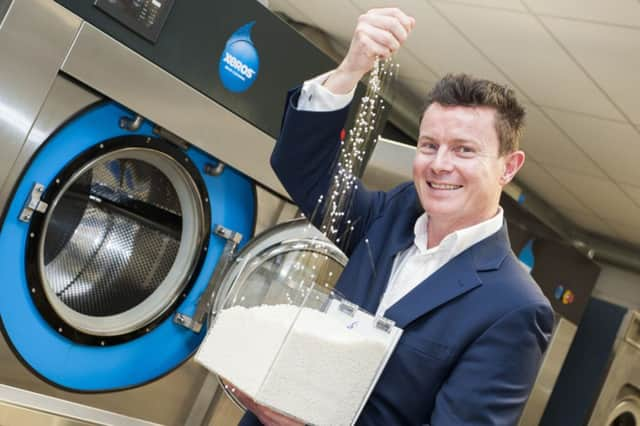Xeros sets sights on homes for laundry revolution


The group, a Rotherham-based spin-out from Leeds University, designs washing machines that replace most of the water with polymer beads.
The beads attract stains to their surface, extracting dirt and producing what the company claims is a far superior result compared with traditional washing machines.
Advertisement
Hide AdAdvertisement
Hide AdXeros said its cleaning systems save laundry customers up to 75 per cent of the water, up to 50 per cent of the energy (used to heat water in the washing machine) and up to 50 per cent of the detergent compared with conventional washing machines.
The group is already supplying big name US hotel groups, such as IHG, Hilton, Marriott, and Wyndham and Choice, with commercial machines, but said its scientists in Rotherham have now come up with a prototype which it hopes to launch in the US domestic market within two years.
Xeros has decided that rather than compete with American washing machine giants, it will license the bead technology to US manufacturers so they can make their own models.
So far five out of the major 10 producers have expressed an interest and Xeros said talks are ongoing.
Advertisement
Hide AdAdvertisement
Hide AdXeros CEO Bill Westwater said: “The licence will say that only Xeros beads are to be used in the machine. The whole point is for us to sell more polymer beads.
“It’s all about delivering new beads to the customer. They can be used hundreds of times and then we pick up the old beads and sell them on further down the supply chain.”
Typical buyers are manufacturers who recycle the polymer beads and turn them into car dashboards.
Xeros has decided to focus on the US for its launch as its commercial business is already up and running there and the market is far larger than the UK.
Advertisement
Hide AdAdvertisement
Hide AdThe US machines tend to be much bigger which also aids the process. Americans usually put their washing machine and tumble drier next to each other in a utility room rather than in the kitchen under the work surface so the machines can be a lot larger.
The drying process will separate any stray beads from the washing. A washing machine will typically contain over 300,000 of the small beads.
However, the team in Rotherham is also working on a smaller washing machine prototype that will be suitable for use in Europe.
Mr Westwater admitted that US manufacturers were initially quite sceptical.
Advertisement
Hide AdAdvertisement
Hide Ad“When they first come to us they are pretty cynical,” he said.
“But we can show them we are achieving benefits that it’s impossible to replicate.
“Also our machines are not that different to what they are already making.”
He said that typically the machines will cost the same price as the top-of-the range machines currently on sale.
Advertisement
Hide AdAdvertisement
Hide AdXeros’s selling point is that customers quickly recoup money by reducing water, heating and detergent costs.
“With our commercial customers as long as we save them more money each month than they would have paid, they’re happy,” said Mr Westwater.
He estimates that if a washing machine has a six-year life, it will need one bead change in a lifetime.
Xeros is now working on the second generation of beads which are super-absorbent.
Advertisement
Hide AdAdvertisement
Hide AdThe firm claims these could mean an end of colour sorting dark clothes from light as the beads will absorb any colour dye run.
“Even blokes are not going to mess-up the washing,” said Mr Westwater.
“It’s not often a UK business cracks the US market. We are proud to be a company from the North and we are committed to staying in the North.”
As part of the group’s commitment to its heartlands it is recruiting graduates from Northern universities such as Sheffield and Leeds.